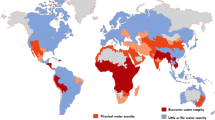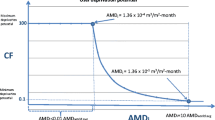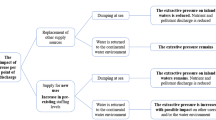Abstract
Most of the transboundary river basins are contested due to the overlapping water demands of their riparian countries. Hence, these border crossing river basins are under immense pressure from the rising water demand. Thus, most of these essential fresh water resources could face water bankruptcy scenario in the future. The Nile river basin is one of these contested river basins. The demand for the river’s water is rising rapidly. Research studies indicated that the river basin could become water bankrupt in the near future. In this article the authors applied the classical bankruptcy water allocation rules for allocating the predicted available water of the river basin. In addition, the authors proposed an innovative way of accounting the water contribution of riparian states and also a mechanism for weighing the water deficit allotted to them. Generally, the authors hope that this article shades some light on allocation of water under water scarcity in the Nile river basin and in other border crossing river basins which could help for avoiding water conflicts and ensuring the sustainability of these crucial freshwater resources.

Similar content being viewed by others
References
Ansink E, Weikard H-P (2009) Contested water rights. Eur J Polit Econ 25(2):247–260
Ansink E, Marchiori C (2010) Reallocating water: an application of sequential sharing rules to Cyprus. FEEM Work Pap No 126(20):1–19
Ansink E, Weikard H-P (2012) Sequential sharing rules for river sharing problems. Soc Choice Welf 38(2):187–210
Aumann RJ, Maschler M (1985) Game theoretical analysis of a bankruptcy problem from the Talmud. J Econ Theory 36(2):195–213
Awulachew S, Rebelo LM, Molden D (2010) The Nile Basin: tapping the unmet agricultural potential of Nile waters. Water Int 35(5):623–654
Awulachew SB, Demissie SS, Hagos F, Erkossa T, Peden D (2012) Water management intervention analysis in the Nile Basin. In: Awulachew SB, Smakhtin V, Molden D, Paden D (eds) The Nile River Basin Water, Agriculture, Governance and Livelihoods. Routledge-Earthscan, Abingdon, pp 292–311
Bosmans K, Lauwers L (2011) Lorenz comparisons of nine rules for the adjudication of conflicting claims. Int J Game Theory 40(4):791–807
Brunnee J, Stephen JT (2002) The Changing Nile Basin Regime: Does Law Matter? Harvard Internl Law J 43(1):107–159
Curiel J, Maschier M, Tijs SH (1987) Bankruptcy games. Z Oper Res 31(5):A143–A159
Dagan N, Volij O (1993) The bankruptcy problem: a cooperative bargaining approach. Math Soc Sci 26(3):287–297
De Stefano L, Duncan J, Dinar S, Stahl K, Strzepek KM, Wolf AT (2012) Climate change and the institutional resilience of international river Bain. J Peace Res 49(1):193–209
Gallastegui MC, Iñarra E, Prellezo R (2002) Bankruptcy of fishing resources: the northern European angler fish fishery. Mar Resour Econ 17(4):291–307
Giménez-Gómez J, Peris J (2014) A proportional approach to claims problems with a guaranteed minimum. Eur J Oper Res 232(1):109–116
Herrero C, Villar A (2001) The three musketeers:-four classical solutions to bankruptcy problem. Math Soc Sci 42(3):307–328
Herrero C, Villar A (2002) Sustainability in bankruptcy problems. TOP 10(2):261–227
Homer D, Thomas F (1994) Environmental scarcities and violent conflict: evidence from cases. Int Secur 19(1):5–40
Kilgour D, Dinar A (2001) Flexible water sharing within an International River basin. Environ Resour Econ 18(1):43–60
Madani K, Zarezadeh M, Morid S (2014) A new framework for resolving conflicts over transboundary rivers using bankruptcy methods. Hydrol Earth Syst Sci 18:3055–3068
Mianabadi H, Mostert E, Zarghami M, Van De Giesa N (2014a) A new bankruptcy method for conflict resolution in water resource allocation. J Environ Manag 144(1):152–159
Mianabadi H, Sheikhmohammady M, Mostert E, Van De Giesen N (2014b) Application of the ordered weighted averaging (OWA) method to the Caspian Sea conflict. Stoch Env Res Risk A 28(6):861
Mianabadi H, Mostert E, Pande S, Giesen N (2015) Weighted bankruptcy rules and transboundary water resources allocation. Water Resour Manag 29(7):2303–2321
Molden D, Awulachew SB, Conniff K, Rebelo LM, Mohamed Y, Peden D, Kinyangi J, van Breugel P, Mukherji A, Cascão A, Notenbaert A, Demissie SS, Neguid MA, El Naggar G (2010) Nile Basin focal project: synthesis report, CGIAR challenge program on water and food. Colombo, Sri Lanka
Moreno-Ternero JD, Villar A (2004) New characterizations of a classical bankruptcy rule. Rev Econ Des 10(2):73–84
Nile Basin Initiative (2012) Water Resources of the Nile basin: Chapter 2 State of the River Nile Basin, http://sob.nilebasin.org
O’Neill B (1982) A problem of rights arbitration from the Talmud. Math Soc Sci 2(4):345–371
Parkes L (2013) The politics of ‘water scarcity’ in the Nile Basin: the case of Egypt. J Politics Intern Stud 9:434–480
Schmeidler D (1969) The nucleolus of a characteristic function game. SIAM J Appl Math 17(6):1163–1170
Sechi GM, Zucca R (2015) Water resource allocation in critical scarcity conditions: a bankruptcy game approach. Water Resour Manag 29(2):541–555
Swain A (2001) Water wars: fact or fiction? Futures 33(8–9):769–781
Swain A (2015) Water wars. In: Wright JD (ed) International encyclopedia of the Social & Behavioral Sciences, vol 25, 2nd edn. Elsevier, Oxford, pp. 443–447
Thomson W (2003) Axiomatic and game-theoretic analysis of bankruptcy and taxation problems: a survey. Math Soc Sci 45(3):249–297
Thomson W (2015) Axiomatic and game-theoretic analysis of bankruptcy and taxation problems: an update. Math Soc Sci 74:41–59
Wolf A (1998) Conflict and cooperation along international waterway. Water Policy 1(2):251–265
Wolf AT, Kramer A, Carius A, and Dabelko GD (2006) Water Can Be a Pathway to Peace, Not War. Woodrow Wilson International Center for Scholar. No. 1, available at: www.wilsoncenter.org/ topics/pubs/NavigatingPeaceIssue1.pdf,
World Bank (2000) the Nile River Basin. Accessed July 10, 2015, http://siteresources.worldbank.org/INTAFRNILEBASINI/About%20Us/21082459/Nile_River_Basin.htm
Yeh C (2006) Protective properties and the constrained equal awards rule for claims problems: a note. Soc Choice Welf 27(2):221–230
Zarezadeh M, Madani K, Morid S (2012) Resolving transboundary water conflicts: lessons learned from the Qezelozan-Sefidrood river bankruptcy problem. Proceedings of World Environmental and Water Resources Congress 2012. Am Soc Civil Eng Reston:2406–2412
Acknowledgments
The authors would like the express their gratitude to the reviewers for their constructive comments and suggestions.
Author information
Authors and Affiliations
Corresponding author
Ethics declarations
This paper has not been submitted elsewhere in identical or similar form.
Conflicts of Interest
There are no potential conflicts of interest.
Rights and permissions
About this article
Cite this article
Degefu, D.M., He, W. Allocating Water under Bankruptcy Scenario. Water Resour Manage 30, 3949–3964 (2016). https://doi.org/10.1007/s11269-016-1403-x
Received:
Accepted:
Published:
Issue Date:
DOI: https://doi.org/10.1007/s11269-016-1403-x




